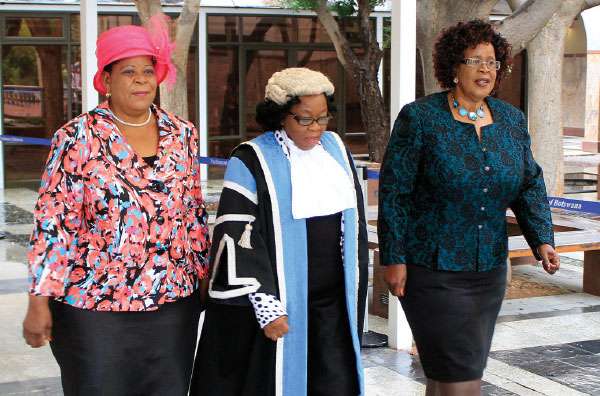Not yet uhuru for women in Botswana
Government’s efforts to achieve gender equality have been a mixed bag of successes and failures. For this reason, it is envisaged that this week’s exposition in Francistown will be used by stakeholders to evaluate the women empowerment agenda in Botswana, celebrate its successes, acknowledge its failures, and mobilise and strategise further.
Held under the theme “Beijing +20 Women Economic Empowerment: Prosperity And Progress For All,” the event is one of several that the government has used for several years as a networking tool with its clients. Hopefully, it is an opportunity for government to get feedback from them. But Botswana still lags behind in some critical areas 20 years after the historic Beijing conference. Held in 1995, the Beijing conference - which attracted activists and delegates from all over the world - identified critical areas such as women and the economy, women in power, violence against women, human rights and women and institutional mechanisms for the advancement of women.
Although it was the fourth international conference on women empowerment, the Beijing conference is considered the most critical gathering on women affairs, owing not only to the robust deliberations that lasted for three weeks but because the conference came up with the Beijing Platform of Action which is hailed as the most progressive blueprint for the economic and social advancement of women. Subsequent to this conference, women became more assertive and visible in political, economic and social spheres and more and more people talked about gender equality. Before the Beijing conference, non-governmental organisations such as the Young Women’s Christian Association (YWCA) and the Botswana Council of Women (BCW) led the agenda on women empowerment in Botswana.
However, to all intents and purposes, their work amounted to lip service mainly due to lack of resources but also because there were no properly defined policies and strategies for the political, economic and social advancement of women.
Also after the Beijing conference, governments throughout the world, including Botswana, domesticated their laws, practices and processes to align them with the principle of gender equality. While on paper, many countries have done well, a lot still needs to be done in the critical areas identified by the Beijing Platform of Action. One of the first achievements in Botswana was to amend the country’s Constitution and related instruments to make them gender neutral by protecting the rights of all as equals before the law regardless of gender. One of the interventions by government has been the introduction of the National Gender Strategy which “... anticipates that various sectors will mainstream gender in their sectoral development programmes,” says its report. The report also reveals that by 2014, the government was in the process of domesticating another international instrument, the Convention on the Elimination of All Forms of Discrimination Against Women (CEPAW).
Hence Botswana is hailed as one of the countries in Africa which have achieved a lot in the issue of women rights. It is argued that Botswana has shown its commitment to the women equality agenda by renaming the hitherto Women’s Affairs Unit the Women’s Affairs Department and later transforming it into the Gender Affairs Department which is more inclusive as it also addresses men issues. The Botswana Country Report on the implementation of the Beijing Platform of Action (Beijing Plus 20 Years), commissioned by the government of Botswana and compiled by a team of consultants, approves government’s feminisation of poverty by introducing the Ipelegeng programme as well as a raft of other economic programmes for women since 2008. Women, it has been found, form an overwhelming majority of Ipelegeng labourers throughout the country.
Government has engaged faith-based organisations and traditional leaders, including chiefs and headmen, and engaged them on cultural and religious practices that work against the advancement of women. One of the outcomes of these interactions has been change of the inheritance law to make it gender inclusive, leading stakeholders to commit to the gender agenda. The team of consultants which compiled the country report approves the fact that the Office of the President coordinates the poverty eradication programmes.
But the Country Report is not amused that the Gender Affairs Department operates under a junior ministry. Currently under the Ministry of Labour and Home Affairs, the consultants feel its mandate would be better looked after if it had worked from the Office of the President. “The rationale here is that the Gender Affairs Department should be located in a ministry with the highest political power with significant influence over finance and power,” says the 2014 report on Botswana. It argues that such an arrangement would aid the women agenda since the OP has the appropriate clout, power and authority to drive the women empowerment strategy.
On the political front, while women constitute 52 percent of Botswana’s population, their representation is negligible. The situation is not helped by the fact that there is no sign that the electoral system will be amended to allow for proportional representation which might see women easily getting seats in parliament. Matters are not helped by the absence of an affirmative action policy either. Nor has the special election dispensation been used to empower women politically. The highest percentage of women representation ever in the Botswana Parliament was in 1999 when women constituted 18.2 percent of the MPs. To-date, Botswana has not met the 1997 SADC Declaration on Gender and Development’s 30 percent quota and the representation has been systematically going down. Another sore point for this country with respect to gender equality is the problem of gender based violence. According to the 2014 Country Report, a study done in 2011 shows that the prevalence of gender-based violence stands at 67 percent in Botswana.






